
Delhi
USFDA Approved Procedures
Minimally invasive. Minimal pain*.
Insurance Paperwork Support
1 Day Procedure

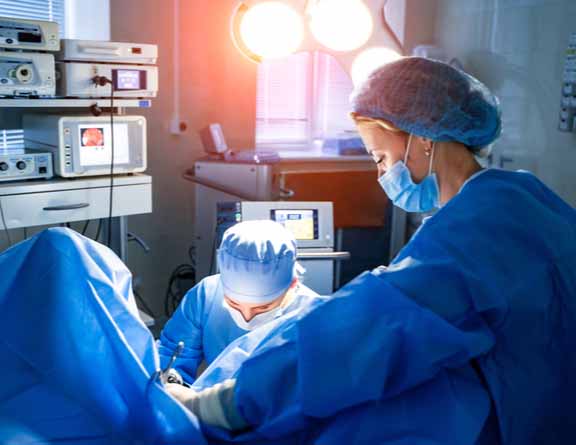
Advanced Cellular Therapy Options for Cerebral Palsy Available in Delhi
At Pristyn Care, we offer advanced cellular therapy solutions designed to support the comprehensive management of cerebral palsy. Our treatment approach is tailored to each patient’s individual needs, with the goal of improving motor function, reducing spasticity, and enhancing quality of life. While there is currently no definitive cerebral palsy cure, these therapies are proving to be a promising addition to conventional treatment plans.
Below is the type of cellular therapy for Cerebral Palsy available in Delhi:
This method uses stem cells derived from the patient’s own body, harvested from bone marrow or adipose (fat) tissue. These cells are then processed and reintroduced into the body to promote repair and regeneration of affected neural tissues. Autologous therapy is widely regarded for its low risk of immune rejection and is often recommended alongside other cerebral palsy therapies for improved results.
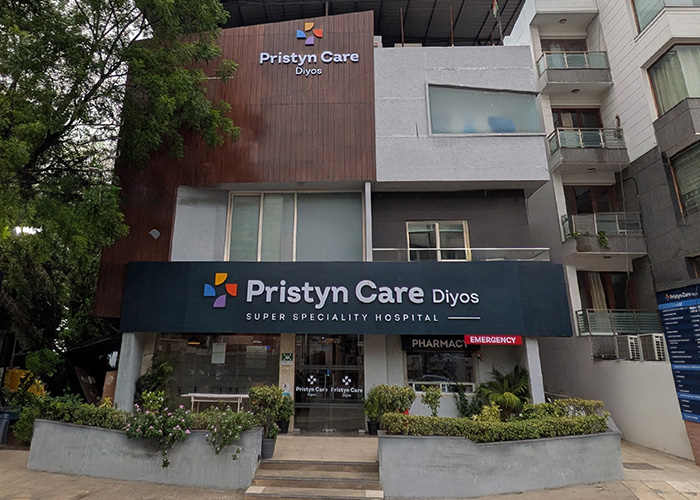


 NABH
NABH
Pristyn Care Diyos Super-Speciality Hospital is committed to redefining modern healthcare by blending cutting-edge technology with compassionate, patient-first care. Located in the heart of Safdarjung Enclave, South Delhi, our NABH-accredited facility offers advanced treatment solutions across multiple specialties, ensuring superior outcomes and faster recoveries.
Our dedicated team of doctors at Pristyn Care Diyos Hospital aims to streamline the entire patient journey—from consultation to recovery—by providing seamless, end-to-end medical care tailored to each individual’s needs.
We offer specialised medical services across a wide range of fields, including urology and andrology, general and laparoscopic surgery, cosmetic and plastic surgery, gynaecology and urogynaecology, orthopaedics, neuro and spine surgery, ENT (ear, nose, and throat), oncology, internal medicine, and critical care. Our facility also extends home care services for enhanced convenience and continuity of care.
The suites and patient rooms at the Hospital are thoughtfully designed to ensure a comfortable and healing environment, featuring modern amenities, hygienic surroundings, and attentive support for both patients and their attendants.
Supported by a skilled clinical team and world-class infrastructure—including modular operation theatres with HEPA filters, advanced diagnostic labs, and high-end medical equipment— Pristyn Care Diyos Hospital stands as a trusted destination for safe, effective, and personalised healthcare.
...Read More
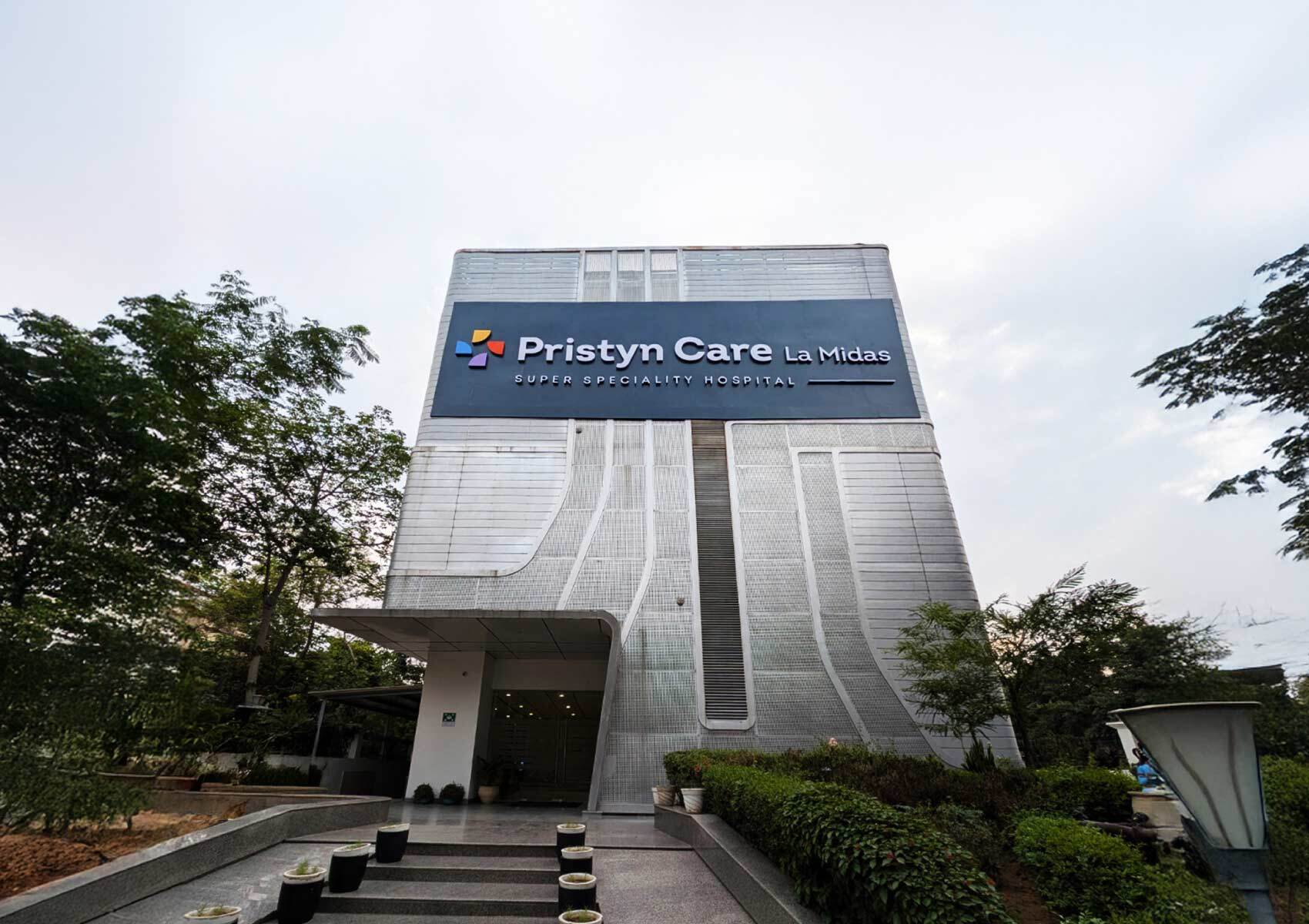


Pristyn Care La Midas is an award-winning, internationally recognised Super Specialty Hospital located in Gurugram, Haryana. We are dedicated to delivering the highest quality aesthetic services, combining advanced medical technology with a compassionate, patient-first approach.
Our state-of-the-art facility offers a comprehensive range of surgical and non-surgical treatments for skin, hair, and body, all at affordable prices. We specialise in services such as laser hair removal, skin rejuvenation, body contouring, and hair restoration, ensuring that each patient receives personalised care tailored to their unique needs.
At Pristyn Care La Midas Hospital, we prioritise patient comfort and satisfaction throughout the treatment journey. Our experienced team of medical professionals is committed to helping you achieve your beauty and wellness goals in the most natural and effective ways possible.
Experience the perfect blend of luxury and innovation at Pristyn Care La Midas Hospital, where your well-being is our top priority.
...Read More
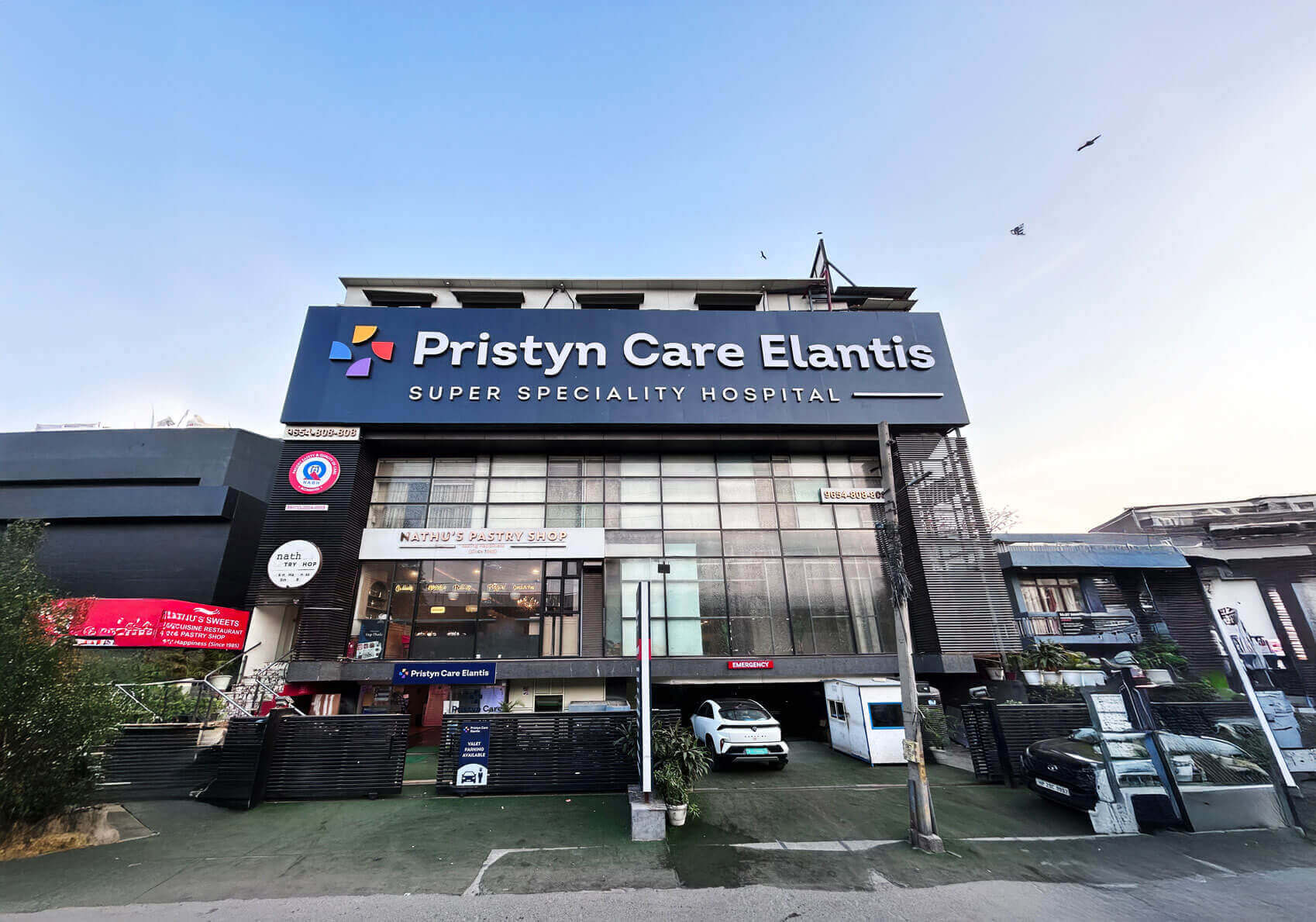

 NABH
NABH
Pristyn Care Elantis is dedicated to revolutionising surgical care. We combine the latest medical technology with highly skilled professionals and a patient-centric approach to transform the healthcare experience. Our team of doctors at Pristyn Care Elantis, strives to simplify the entire patient journey, ensuring a seamless process from diagnosis through recovery.
We offer specialised treatments across a wide range of medical fields, including proctology, laparoscopic surgery, ENT (ear, nose, and throat), vascular, gynaecology, urology, aesthetics, orthopaedics, ophthalmology, and weight loss solutions.
The Suites & Rooms at Pristyn Care Elantis are designed with your comfort in mind, offering a welcoming ambiance and top-notch amenities to make your stay as pleasant as possible.
Our highly skilled medical team, supported by advanced infrastructure, makes us a trusted choice for comprehensive healthcare solutions.
...Read More
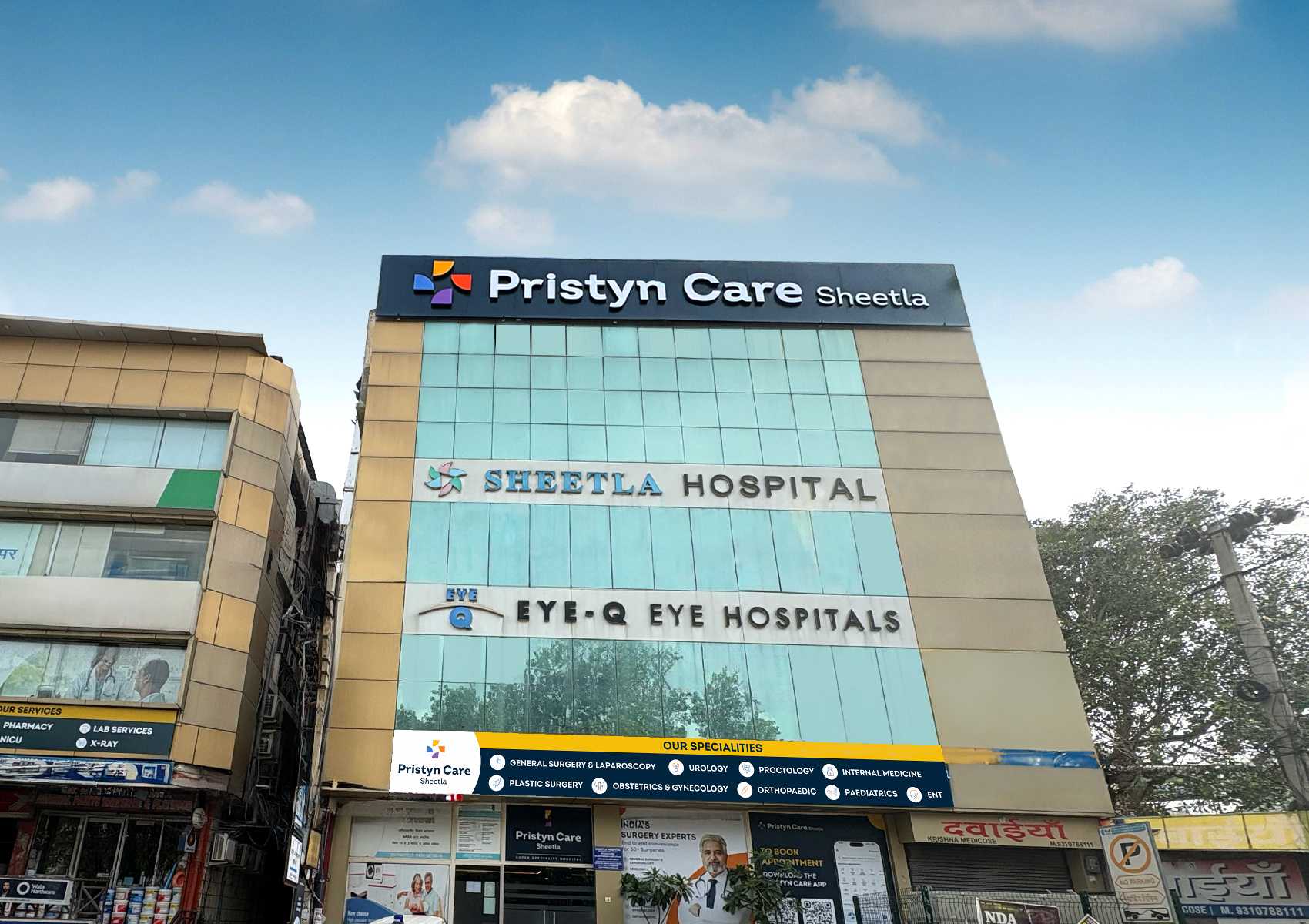


 NABH
NABH
Pristyn Care Sheetla Hospital in Gurgaon makes quality healthcare more accessible and personal. The hospital offers advanced treatment across various specialties like women’s health, child and neonatal care, etc. and minimally invasive surgery. With 36 well-equipped beds, 3 modern operation theatres, and a dedicated ICU, Pristyn Care Sheetla works with comfort and efficiency. With 90+ experienced doctors and a courteous professional medical team, we ensure clear communication, personalized care, and real results – so you feel supported every step of the way.
...Read More
Delivering Seamless Surgical Experience in India
Your safety is taken care of by thermal screening, social distancing, sanitized clinics and hospital rooms, sterilized surgical equipment and mandatory PPE kits during surgery.
A dedicated Care Coordinator assists you throughout the surgery journey from insurance paperwork, to free commute from home to hospital & back and admission-discharge process at the hospital.
Our surgeons spend a lot of time with you to diagnose your condition. You are assisted in all pre-surgery medical diagnostics. We offer advanced laser and laparoscopic surgical treatment. Our procedures are USFDA approved.
We offer free follow-up consultations and instructions including dietary tips as well as exercises to every patient to ensure they have a smooth recovery to their daily routines.
Currently, there is no definitive cerebral palsy cure. However, cellular therapy may significantly help in the management of cerebral palsy by improving the patient’s quality of life, mobility, and overall function. It is considered a supportive treatment rather than a standalone cure.
Patients with cerebral palsy who have not responded well to traditional therapies or who are seeking additional options for functional improvement may be considered for cellular therapy. A detailed medical assessment by a qualified specialist is essential to determine suitability.
Cellular therapy may help improve motor coordination, reduce stiffness and muscle tightness, enhance speech and cognitive abilities, and increase independence in daily activities. When combined with standard cerebral palsy therapies, it can offer more comprehensive and sustained improvements.
At leading centres such as Pristyn Care, cerebral palsy therapy in Delhi is tailored to each patient and may include cellular therapy, physiotherapy, occupational therapy, and speech therapy. The stem cells used may be autologous (from the patient) or allogeneic (from a donor), depending on individual requirements.
Cellular therapy is generally safe when performed by experienced professionals in a controlled medical setting. However, as with any medical procedure, there may be minimal risks such as infection or mild immune response. These are carefully managed to ensure patient safety.
The timeline for visible improvements can vary. Some patients may begin to notice changes within weeks, while others may take several months. Continuous follow-up and supportive therapies are essential to maximise the benefits over time.
No, cellular therapy is not intended to replace traditional therapies but to complement them. It works best as part of an integrated care plan that includes physical, occupational, and speech therapies, forming a comprehensive strategy for the management of cerebral palsy.
The cost can vary depending on the type of therapy used, the severity of the condition, and the treatment facility. It is best to consult with the healthcare provider for a detailed breakdown of the costs, including initial assessments, treatment sessions, and follow-up care.
Determining eligibility for cellular therapy in individuals with cerebral palsy involves a thorough clinical evaluation. This helps ensure that the treatment is not only safe but also aligned with the patient’s specific needs and health condition. While cellular therapy is not a definitive cerebral palsy cure, it can significantly enhance the outcomes when integrated into a holistic approach for the management of cerebral palsy.
Cellular therapy may be considered for children or adults who have been diagnosed with cerebral palsy, particularly those presenting with motor impairments, spasticity, or developmental delays. It is often recommended as part of a broader treatment plan that includes conventional cerebral palsy therapies such as physiotherapy, occupational therapy, and speech therapy.
Patients who have not achieved adequate improvements with standard therapy approaches may be eligible for cellular therapy. When conventional cerebral palsy therapy and other treatments reach a plateau in progress, cellular therapy may offer an additional pathway to enhance further functional gains.
Eligibility is also based on the clinical assessment of the brain and nervous system’s ability to respond to regenerative treatment. Those with signs of preserved neural pathways or potential for neuroplasticity are more likely to benefit from cellular therapy.
Candidates must be in generally good health to undergo the procedure. This includes being free from active infections, uncontrolled medical conditions, or contraindications that could increase the risk of complications. The overall safety and success of the therapy rely heavily on the patient’s baseline health.
Before proceeding with treatment, a series of detailed evaluations are conducted to determine suitability:
Preparing for cellular therapy is an important step in ensuring that the treatment is both safe and effective. Below are key points to help guide your preparation:
Before beginning treatment, your healthcare team will conduct a thorough review of the patient’s medical history, diagnosis, and any previous interventions. It’s essential to provide full details of the condition, particularly regarding motor difficulties, developmental milestones, and any prior cerebral palsy therapies undertaken. This helps tailor the most appropriate treatment plan.
Inform your doctor about all current medications, including prescription, over-the-counter, and herbal supplements. In some cases, adjustments may be required. If the patient is currently engaged in cerebral palsy therapy in Delhi or elsewhere (such as physiotherapy or speech therapy), your specialist may coordinate with those therapists to ensure a cohesive approach before and after cellular therapy.
You may be asked to undergo diagnostic tests such as MRI scans, blood work, and neurological assessments. These help confirm suitability for cellular therapy and serve as a baseline for measuring progress in the management of cerebral palsy.
Depending on the complexity of the case and the type of cellular therapy used, recovery may involve a short observation period followed by rehabilitation. It is advisable to arrange any necessary support at home—this could include mobility assistance, help with daily tasks, or continued therapy sessions to maximise results.
Open communication with your doctor or care team is vital. Ask questions about how the treatment works, what improvements may be possible, and how it complements other therapies. While cellular therapy is not a definitive cerebral palsy cure, it can offer meaningful improvements in function and quality of life, especially when integrated into a broader, ongoing care plan.
Following cellular therapy, appropriate post-procedure care is essential to promote healing, support recovery, and enhance the effectiveness of the treatment. Below are key aspects of post-treatment care:
After the procedure, it is important to allow the body time to rest. Physical activity should be limited initially, particularly if sedation or anaesthesia was used. Your medical team will advise on when and how to gradually return to therapy or daily routines, depending on the patient’s overall condition and response to treatment.
Good nutrition and adequate hydration play an important role in recovery. A well-balanced diet supports the immune system and cellular repair, which is especially important for individuals undergoing cerebral palsy therapies.
Although cellular therapy is generally well tolerated, it’s important to keep an eye on any post-procedure symptoms. If you notice fever, swelling, discomfort at the injection site, or any unusual weakness, contact your healthcare provider promptly. Early intervention helps prevent complications.
Attending all follow-up appointments is important. These check-ins allow your care team to monitor progress, evaluate the patient’s response to therapy, and adjust the broader treatment plan as needed. Follow-ups are an integral part of cerebral palsy therapy in Delhi and beyond.
Cellular therapy is most effective when paired with ongoing rehabilitation. Physiotherapy, occupational therapy, and speech therapy may all continue as part of the long-term management of cerebral palsy. These therapies help maximise the benefits of cellular treatment by improving muscle tone, coordination, and cognitive function.
If any medications—such as pain relievers, anti-inflammatory drugs, or supplements—are prescribed post-procedure, they should be taken exactly as directed. They may play a role in easing recovery and preventing any adverse effects.
During the initial healing phase, it is advisable to avoid strenuous physical activity or exercises that put stress on the body. Your therapist or medical team will guide you on when it is safe to resume more intensive movement or therapy routines.
The journey of living with cerebral palsy can bring emotional challenges—for both the individual and their family. Seeking psychological support or joining a local support group can be helpful in managing expectations and maintaining wellbeing during recovery.